-

新人教版高中英语必修3Unit 5 The value of money-Reading and Thinking教学设计二
? Could you offer me some kind of work here?? I don’t want your charity, I just want an honest job.? Careless: I landed in Britain by accident.Step 7:Consolidation.? Find Henry? Roderick and Oliver were I .making a bet when they saw Henry, a poor young man. ? Know Henry? About a month ago, Henry was sailing and later he found himself carried out to sea by a strong wind. Fortunately, he 2.was spotted by a ship. And it was the ship that brought him to 3.England? Offer money to Henry ? Oliver and Roderick gave Henry a letter and told him that there was money in it. They 4.persuaded him to accept it, and made him 5.promise that it wouldn't be opened until 2 o'clock.Step 8:Language pointsa large amount of: a large quantity of; a great deal ofe.g. They bought a large amount of furniture before they moved their new house.make a bet: make an arrangement to risk money, etc. on an event of which the result is doubtful.e.g. We made a bet on the result of the match.permit sb to do something: allow somebody to do somethinge.g. My mother doesn’t permit me to ride in the street after it rained.by accident: as a result of chancee.g. I only found it by accident.stare at: look at somebody or something with the eyes wide open in a fixed gaze( in astonishment, wonder, fear, etc)to be honest: to tell you the truth; to be franke.g. To be honest, I don’t think we have a chance of winning.Step7 Homework:What do you think will happen to Henry? Will the bank-note help him or get him into trouble?

新人教版高中英语必修3Unit 5 The Value of Money-Reading for Writing教学设计二
2. 您能看到, 我头发太长了。You can see that my hair is much too long.3. 无论什么时候, 只要您想回来就回来。Please come back whenever you want.4. 您仅有很少的头发要理! You only have too little hair to cut !5. 为您服务是我的荣幸!It is my honour to serve you!Step 9 Writing(Henry is walking down the street when he sees a sign for a place that cuts hair. He decides to have it cut. )H=Henry B=BarberH: Good afternoon, I’d like to have my hair cut, if I may. (The barber looks at Henry’s hair and continues cutting another man’s hair. ) Er, I’d really like a haircut. As you can see it’s much too long. B: (in a rude manner) Yes, I can see that. Indeed, I can. H: Fine, well, I’ll have a seat then. (He sits in one of the barber’s chairs. The barber turns to look at Henry. )B: It’s quite expensive here, you know! Are you sure you can afford it?H: Yes. I think so. (After his hair is cut, the barber tells Henry how much he must pay. Henry shows the barber the bank note. )B: Why Mr. . . (looks shocked)H: Adams. Henry Adams. I’m sorry. I don’t have any change. B: Please don’t worry! (wearing a big smile) Nothing to worry about! Nothing at all! Please come back whenever you want, even if you only have too little hair to cut! It will be my honour to serve you!Step 10 Pair workExchange drafts with a partner. Use this checklist to help your partner revise his/her draft.1. Are all the elements of a play included and in good order ?2. Do the character use suitable language ?3. Are the stage directions clear and useful ?4. Is the plot clear and exciting enough ?

新人教版高中英语必修3Unit 5 the value of money-Reading For Writing教学设计一
【参考范文】Narrator:(Henry is smiling as he leaves the restaurant. As he is walking down the street, he sees a sign for a place that cuts hair. He decides to get it cut. )H=Henry;B=Barber;R=rude manH:Good afternoon, I'd like to get a cut, if I may. (The barber looks at Henry's hair and continues cutting another man's hair. )Er, I'd really like a haircut. As you can see it's much too long. B:(in a rude manner) Yes, I can see that. Indeed, I can. H:Fine, well I'll have a seat then. (He sits in one of the barber's chairs. The barber turns to look at Henry. )B:It's quite expensive here, you know!Are you sure you can afford it?H:Yes. I think so. (In comes the rude man. )R:Hey you there. I need a haircut quickly. Can you do me straightaway?B:All right, then, get in the chair and I'll see what I can do. R:Thank you. (sits down in one of the barber's chairs)H:Excuse me, but I was here first. Aren't you going to do my hair first?B:This man's in a hurry. H:Well so am I!I insist that you cut my hair first. B:OK, but I'll have to be quick. This gentleman is waiting. H:Thank you. (They both become quiet. After his hair is cut, the barber tells Henry how much he must pay. Henry shows the barber the bank note. )B:Why, Mr . . . (looks shocked)H:Adams. Henry Adams. I'm sorry, I don't have any change. R:You're that Mr Adams! Well,I'm glad I waited or I might never have known it was you. B:Why, Mr Adams, please don't worry!(wearing a big smile) Nothing to worry about!Nothing at all!Please come back any time, even if you only need too little hairs cut!It will be my honour to serve you!

新人教版高中英语选修2Unit 1 Science and Scientists-Discovering useful structures教学设计
The grammatical structure of this unit is predicative clause. Like object clause and subject clause, predicative clause is one of Nominal Clauses. The leading words of predicative clauses are that, what, how, what, where, as if, because, etc.The design of teaching activities aims to guide students to perceive the structural features of predicative clauses and think about their ideographic functions. Beyond that, students should be guided to use this grammar in the context apporpriately and flexibly.1. Enable the Ss to master the usage of the predicative clauses in this unit.2. Enable the Ss to use the predicative patterns flexibly.3. Train the Ss to apply some skills by doing the relevant exercises.1.Guide students to perceive the structural features of predicative clauses and think about their ideographic functions.2.Strengthen students' ability of using predicative clauses in context, but also cultivate their ability of text analysis and logical reasoning competence.Step1: Underline all the examples in the reading passage, where noun clauses are used as the predicative. Then state their meaning and functions.1) One theory was that bad air caused the disease.2) Another theory was that cholera was caused by an infection from germs in food or water.3) The truth was that the water from the Broad Street had been infected by waste.Sum up the rules of grammar:1. 以上黑体部分在句中作表语。2. 句1、2、3中的that在从句中不作成分,只起连接作用。 Step2: Review the basic components of predicative clauses1.Definition

新人教版高中英语选修2Unit 4 Journey Across a Vast Land教学设计
当孩子们由父母陪同时,他们才被允许进入这个运动场。3.过去分词(短语)作状语时的几种特殊情况(1)过去分词(短语)在句中作时间、条件、原因、让步状语时,相当于对应的时间、条件、原因及让步状语从句。Seen from the top of the mountain (=When it is seen from the top of the mountain), the whole town looks more beautiful.从山顶上看,整个城市看起来更美了。Given ten more minutes (=If we are given ten more minutes), we will finish the work perfectly.如果多给十分钟,我们会完美地完成这项工作。Greatly touched by his words (=Because she was greatly touched by his words), she was full of tears.由于被他的话深深地感动,她满眼泪花。Warned of the storm (=Though they were warned of the storm), the farmers were still working on the farm.尽管被警告了风暴的到来,但农民们仍在农场干活。(2)过去分词(短语)在句中作伴随、方式等状语时,可改为句子的并列谓语或改为并列分句。The teacher came into the room, followed by two students (=and was followed by two students).后面跟着两个学生,老师走进了房间。He spent the whole afternoon, accompanied by his mom(=and was accompanied by his mom).他由母亲陪着度过了一整个下午。

新人教版高中英语选修2Unit 1 Science and Scientists-Learning about Language教学设计
Step 7: complete the discourse according to the grammar rules.Cholera used to be one of the most 1.__________ (fear) diseases in the world. In the early 19th century, _2_________ an outbreak of cholera hit Europe, millions of people died. But neither its cause, 3__________ its cure was understood. A British doctor, John Snow, wanted to solve the problem and he knew that cholera would not be controlled _4_________ its cause was found. In general, there were two contradictory theories 5 __________ explained how cholera spread. The first suggested that bad air caused the disease. The second was that cholera was caused by an _6_________(infect) from germs in food or water. John Snow thought that the second theory was correct but he needed proof. So when another outbreak of cholera hit London in 1854, he began to investigate. Later, with all the evidence he _7_________ (gather), John Snow was able to announce that the pump water carried cholera germs. Therefore, he had the handle of the pump _8_________ (remove) so that it couldn't be used. Through his intervention,the disease was stopped in its tracks. What is more, John Snow found that some companies sold water from the River Thames that __9__________________ (pollute) by raw waste. The people who drank this water were much more likely _10_________ (get) cholera than those who drank pure or boiled water. Through John Snow's efforts, the _11_________ (threaten) of cholera around the world saw a substantial increase. Keys: 1.feared 2.when 3. nor 4.unless 5.that/which 6.infection 7.had gathered 8.removed 9.was polluted 10.to get 11. threat

新人教版高中英语选修2Unit 1 Science and Scientists-Reading and thinking教学设计
Step 5: After learning the text, discuss with your peers about the following questions:1.John Snow believed Idea 2 was right. How did he finally prove it?2. Do you think John Snow would have solved this problem without the map?3. Cholera is a 19th century disease. What disease do you think is similar to cholera today?SARS and Covid-19 because they are both deadly and fatally infectious, have an unknown cause and need serious public health care to solve them urgently.keys:1. John Snow finally proved his idea because he found an outbreak that was clearly related to cholera, collected information and was able to tie cases outside the area to the polluted water.2. No. The map helped John Snow organize his ideas. He was able to identify those households that had had many deaths and check their water-drinking habits. He identified those houses that had had no deaths and surveyed their drinking habits. The evidence clearly pointed to the polluted water being the cause.3. SARS and Covid-19 because they are both deadly and fatally infectious, have an unknown cause and need serious public health care to solve them urgently.Step 6: Consolidate what you have learned by filling in the blanks:John Snow was a well-known _1___ in London in the _2__ century. He wanted to find the _3_____ of cholera in order to help people ___4_____ it. In 1854 when a cholera __5__ London, he began to gather information. He ___6__ on a map ___7___ all the dead people had lived and he found that many people who had ___8____ (drink) the dirty water from the __9____ died. So he decided that the polluted water ___10____ cholera. He suggested that the ___11__ of all water supplies should be _12______ and new methods of dealing with ____13___ water be found. Finally, “King Cholera” was __14_____.Keys: 1. doctor 2. 19th 3.cause 4.infected with 5.hit 6.marked 7.where 8.drunk 9.pump 10.carried 11.source 12.examined 13.polluted 14.defeatedHomework: Retell the text after class and preview its language points

新人教版高中英语选修2Unit 2 Bridging Cultures-Discovering useful structures教学设计
The grammar of this unit is designed to review noun clauses. Sentences that use nouns in a sentence are called noun clauses. Nominal clauses can act as subject, object, predicate, appositive and other components in compound sentences. According to the above-mentioned different grammatical functions, nominal clauses are divided into subject clause, object clause, predicate clause and appositive clause. In this unit, we will review the three kinds of nominal clauses. Appositive clauses are not required to be mastered in the optional compulsory stage, so they are not involved.1. Guide the students to judge the compound sentences and determine the composition of the clauses in the sentence.2. Instruct students to try to learn grammar by generalizing grammar rules, controlling written practice, and semi-open oral output.3. Inspire the students to systematize the function and usage of noun clause1.Instruct students to try to learn grammar by generalizing grammar rules, controlling written practice, and semi-open oral output.2.Inspire the students to systematize the function and usage of noun clauseStep1: The teacher ask studetns to find out more nominal clauses from the reading passage and udnerline the nominal clauses.

新人教版高中英语选修2Unit 3 Food and Culture-Discovering useful structures教学设计
The newspaper reported more than 100 people had been killed in the thunderstorm.报纸报道说有一百多人在暴风雨中丧生。(2)before、when、by the time、until、after、once等引导的时间状语从句的谓语是一般过去时,以及by、before后面接过去的时间时,主句动作发生在从句的动作或过去的时间之前且表示被动时,要用过去完成时的被动语态。By the time my brother was 10, he had been sent to Italy.我弟弟10岁前就已经被送到意大利了。Tons of rice had been produced by the end of last month. 到上月底已生产了好几吨大米。(3) It was the first/second/last ... time that ...句中that引导的定语从句中,主语与谓语构成被动关系时,要用过去完成时的被动语态。It was the first time that I had seen the night fact to face in one and a half years. 这是我一年半以来第一次亲眼目睹夜晚的景色。(4)在虚拟语气中,条件句表示与过去事实相反,且主语与谓语构成被动关系时,要用过去完成时的被动语态。If I had been instructed by him earlier, I would have finished the task.如果我早一点得到他的指示,我早就完成这项任务了。If I had hurried, I wouldn't have missed the train.如果我快点的话,我就不会误了火车。If you had been at the party, you would have met him. 如果你去了晚会,你就会见到他的。

新人教版高中英语选修2Unit 5 First Aid-Discovering useful structures教学设计
You have no excuse for not going.你没有理由不去。He was punished for not having finished his homework.他因未完成作业而受到惩罚。2.动词ing形式复合结构由物主代词或人称代词宾格、名词所有格或普通格加动词ing,即“sb./sb.'s+doing”构成。动词ing形式的复合结构实际上是给动词ing形式加了一个逻辑主语。动词ing形式的复合结构有四种形式:①形容词性物主代词+动词ing②名词所有格+动词ing③代词宾格+动词ing④名词+动词ingHer coming to help encouraged all of us.她来帮忙鼓舞了我们所有人。The baby was made awake by the door suddenly shutting.这个婴儿被突然的关门声吵醒了。Can you imagine him/Jack cooking at home?你能想象他/杰克在家做饭的样子吗?无生命名词无论是作主语还是作宾语都不能用第②种形式。Tom's winning first prize last year impressed me a lot.汤姆去年得了一等奖使我印象深刻。Do you mind my/me/Jack's/Jack leaving now?你介意我/杰克现在离开吗?Excuse me for my not coming on time.很抱歉我没能按时来。His father's being ill made him worried.他父亲病了,他很担心。We are looking forward to the singer's/the singer to give us a concert.我们盼望着这位歌手来给我们举办一场演唱会。
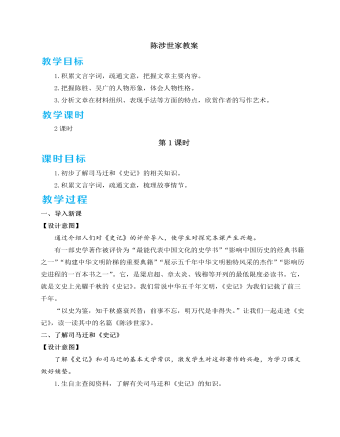
人教部编版语文九年级下册陈涉世家教案
1.王侯是一个地区的实际统治者,世代保有其国,对全国政局有一定的影响,故其传记称为“世家”。陈涉并非王侯,司马迁为什么把他归入“世家”?《史记》中人物传记分为三类,“本纪”记帝王,“世家”记王侯,“列传”记人臣,但这只是一个大略的划分,对于某些历史人物,作者有他特殊的考虑。陈涉就是一个特例。他出身低微,起义后虽自立为王,但为时仅六个月。之所以列入“世家”,是因为在秦王朝的严酷统治下首先发难,的确是非常之功。司马迁在这篇传记的最后写道:“陈胜虽已死,其所置遣侯王将相卒亡秦,由涉首事也。”可见司马迁看重的是功业,而不以成败论英雄。类似的例子有项羽,他并未统一称帝,但作者高度评价了他在反秦斗争中的领导作用,把他列入“本纪”。2.本文是长篇节选,在结构上具有怎样的特点?
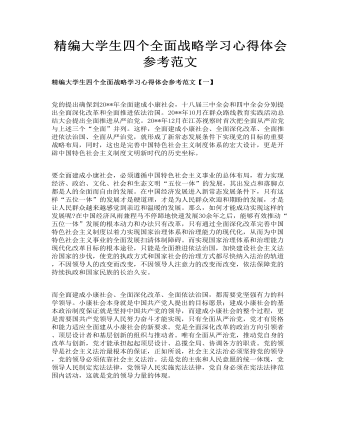
精编大学生四个全面战略学习心得体会参考范文
要全面建成小康社会,必须遵循中国特色社会主义事业的总体布局,着力实现经济、政治、文化、社会和生态文明“五位一体”的发展,其出发点和落脚点都是人的全面而自由的发展。在中国经济发展进入新常态发展条件下,只有这样“五位一体”的发展才是硬道理,才是为人民群众欢迎和期盼的发展,才是让人民群众越来越感觉到亲近和温暖的发展
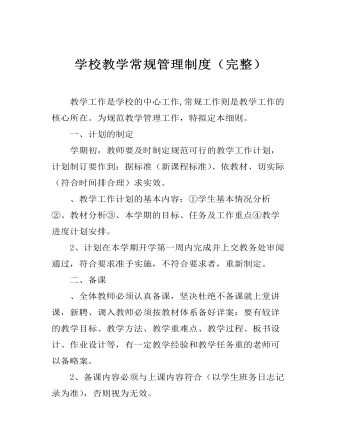
学校教学常规管理制度(完整)
一、计划的制定 学期初,教师要及时制定规范可行的教学工作计划,计划制订要作到:据标准(新课程标准)、依教材、切实际(符合时间排合理)求实效。 、教学工作计划的基本内容:①学生基本情况分析②、教材分析③、本学期的目标、任务及工作重点④教学进度计划安排。 2、计划在本学期开学第一周内完成并上交教务处审阅通过,符合要求准予实施,不符合要求者,重新制定。
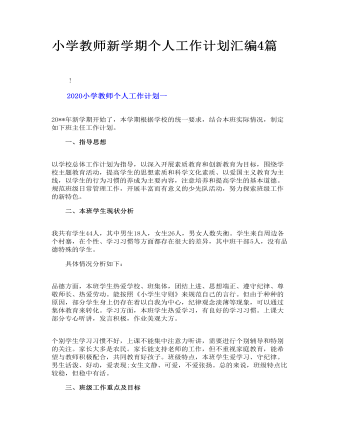
小学教师新学期个人工作计划汇编4篇
一、指导思想 以学校总体工作计划为指导,以深入开展素质教育和创新教育为目标,围绕学校主题教育活动,提高学生的思想素质和科学文化素质、以爱国主义教育为主线,以学生的行为习惯的养成为主要内容,注意培养和提高学生的基本道德。规范班级日常管理工作,开展丰富而有意义的少先队活动,努力探索班级工作的新特色。
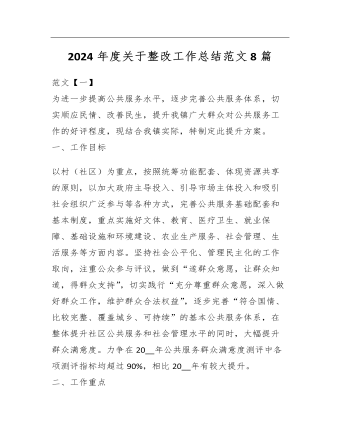
(8篇)2024年度关于整改工作总结范文
八、针对应计未计固定资产问题,乡政府专门成立了固定资产管理登记小组,对乡政府在用固定资产(包括房屋、土地等)进行了全面清查、逐一登记。对应计未计的固定资产及时作了账务补充登记,健全了固定资产动态管理机制,有效的防止了固有资产流失。经过近两个月的积极整改,我乡财务管理和经济运行已经步入规范化轨道,在今后的工作中我们还将着重加强以下几个方面的工作:一是加强会计队伍建设。组织财会人员学习相关专业知识,抓好业务技能培训,强化岗位责任意识,切实提高财会人员的政治素质和业务素质。二是加强预(决)算执行。严格按照《预算法》的规定编制乡镇预算,坚决杜绝虚列财政收入和支出。对村级的转移支付严格按照有关政策规定及时足额拨付到位,不挤占、挪用,确保惠农政策执行不走样。
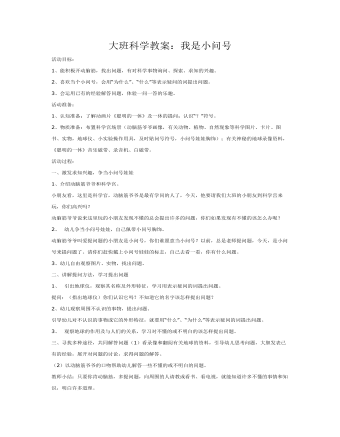
大班科学教案:我是小问号
3、会运用已有的经验解答问题,体验一问一答的乐趣。活动准备:1、认知准备:了解动画片《聪明的一休》及一休的提问;认识“?”符号。2、物质准备:布置科学宫场景(动脑筋爷爷画像,有关动物、植物、自然现象等科学图片、卡片、图书、实物,地球仪、小实验操作用具,及时贴问号符号,小问号娃娃胸饰);有关神秘的地球录像资料,《聪明的一休》音乐磁带、录音机、白磁带。活动过程:一、激发求知兴趣,争当小问号娃娃1、介绍动脑筋爷爷和科学宫。小朋友看,这里是科学官,动脑筋爷爷是最有学问的人了,今天,他要请我们大班的小朋友到科学宫来玩,你们高兴吗?动脑筋爷爷说来这里玩的小朋友发现不懂的总会提出许多的问题,你们如果发现有不懂的该怎么办呢?2、 幼儿争当小问号娃娃,自己佩带小问号胸饰。动脑筋爷爷叫爱提问题的小朋友是小问号,你们谁愿意当小问号?以前,总是老师提问题,今天,是小问号来提问题了。请你们赶快戴上小问号娃娃的标志,自己去看一看,你有什么问题。
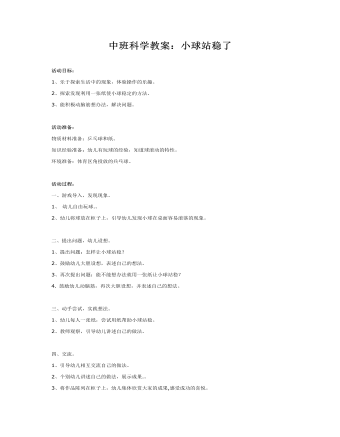
中班科学教案:小球站稳了
2、探索发现利用一张纸使小球稳定的方法。3、能积极动脑筋想办法,解决问题。 活动准备:物质材料准备:乒乓球和纸。知识经验准备:幼儿有玩球的经验,知道球滚动的特性。环境准备:体育区角投放的兵乓球。
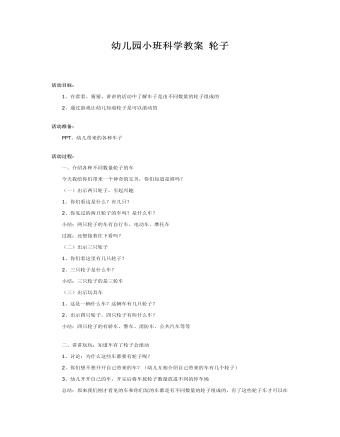
幼儿园小班科学教案 轮子
2、通过游戏让幼儿知道轮子是可以滚动的活动准备:PPT、幼儿带来的各种车子活动过程: 一、介绍各种不同数量轮子的车 今天我给你们带来一个神奇的宝贝,你们知道是谁吗? (一)出示两只轮子,引起兴趣1、你们看这是什么?有几只?2、你见过的两只轮子的车吗?是什么车? 小结:两只轮子的车有自行车、电动车、摩托车 过渡:还想接着往下看吗?
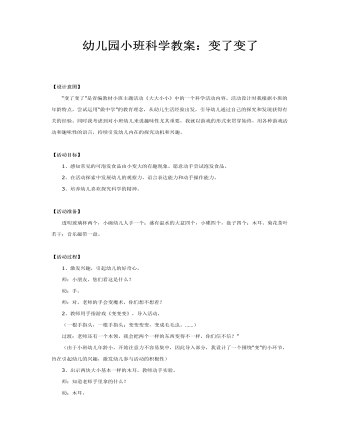
小班科学教案 变了变了 .
【活动目标】1、感知常见的可泡发食品由小变大的有趣现象。愿意动手尝试泡发食品。2、在活动探索中发展幼儿的观察力、语言表达能力和动手操作能力。3、培养幼儿喜欢探究科学的精神。 【活动准备】 透明玻璃杯两个,小碗幼儿人手一个;盛有温水的大盆四个,小碟四个,盘子四个;木耳、菊花茶叶若干;音乐磁带一盘。 【活动过程】1、激发兴趣,引起幼儿的好奇心。 师:小朋友,您们看这是什么? 幼:手。 师:对,老师的手会变魔术,你们想不想看?2、教师用手指游戏《变变变》,导入活动, (一根手指头,一根手指头;变变变变,变成毛毛虫。……) 过渡:老师还有一个本领,我会把两个一样的东西变得不一样,你们信不信?” (由于小班幼儿年龄小,开始注意力不容易集中,因此导入部分,我设计了一个围绕“变”的小环节,旨在引起幼儿的兴趣,激发幼儿参与活动的积极性)3、出示两块大小基本一样的木耳,教师动手实验。
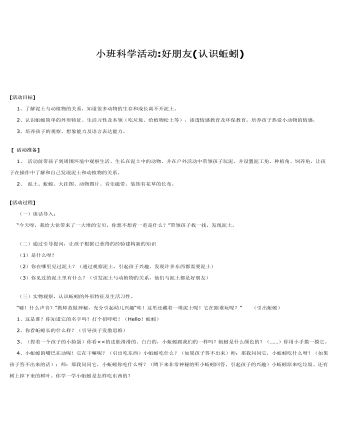
小班科学教案 好朋友
(一)谈话导入: “今天呀,我给大伙带来了一大堆的宝贝,你想不想看一看是什么?”带领孩子找一找,发现泥土。 (二)通过引导提问,让孩子根据已获得的经验建构新的知识 (1)是什么呀? (2)你在哪里见过泥土?(通过观察泥土,引起孩子兴趣,发现许多东西都需要泥土) (3)你见过的泥土里有什么?(引发泥土与动植物的关系,他们与泥土都是好朋友) (三)实物观察,认识蚯蚓的外形特征及生活习性。 “嘘!什么声音?”教师故做神秘,充分引起幼儿兴趣“哇!这里还藏着一堆泥土呢!它在跟谁玩呢?” (引出蚯蚓) 1、这是谁?你知道它的名字吗?打个招呼吧!(Hello!蚯蚓) 2、你看蚯蚓长的什么样?(引导孩子发散思维) 3、(捏着一个孩子的小脸蛋)你看××的皮肤滑滑的、白白的,小蚯蚓跟我们的一样吗?蚯蚓是什么颜色的?(……)你用小手摸一摸它。 4、小蚯蚓的嘴巴在动呢!它在干嘛呢?(引出吃东西)小蚯蚓吃什么?(如果孩子答不出来)师:那我问问它,小蚯蚓吃什么呀?(如果孩子答不出来的话):师:那我问问它,小蚯蚓你吃什么呀?(蹲下来非常神秘的听小蚯蚓回答,引起孩子的兴趣)小蚯蚓原来吃垃圾、还有树上掉下来的树叶。你学一学小蚯蚓是怎样吃东西的? (四)以生动形象的故事贯穿,让幼儿了解蚯蚓给植物松土的本领。



